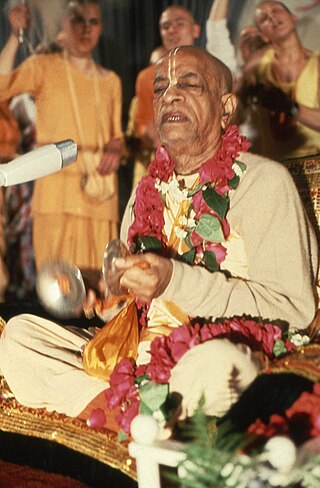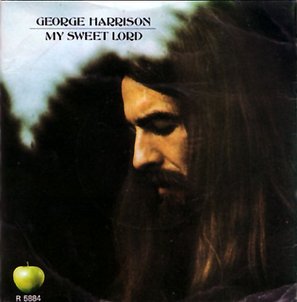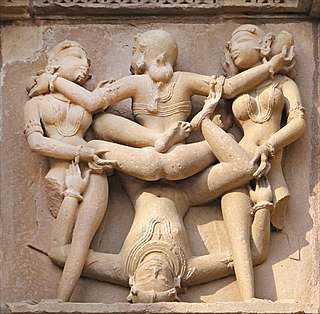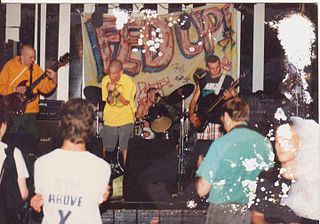This article needs additional citations for verification .(October 2013) |
Contributions to popular culture involving direct reference to the Hare Krishna mantra include the following.
This article needs additional citations for verification .(October 2013) |
Contributions to popular culture involving direct reference to the Hare Krishna mantra include the following.
After coming in contact with the Hare Krishnas in 1969, some of the Beatles took an interest in the movement. [1] This interest is reflected in songs recorded by the band and its members.
In the 1980s, several bands and individuals from the punk-related straight edge subculture took interest in the Hare Krishna doctrines, leading to a number of straight edgers becoming official members of the movement. Due to the influence of a Hare Krishna named Larry Pugliese, Krishna Consciousness found its way into the New York hardcore scene in the mid-1980s and became known as Krishnacore. [7]
Early devotees included John Joseph and Harley Flanagan of the band Cro-Mags, Caine Rose and Jai Nitai Holzman of Fed Up!, Ray Cappo of Youth of Today, and Vic DiCara, former guitarist for Los Angeles band Inside Out, who established quite possibly the most famous of all of the newly dubbed bands, namely 108. [8] [9]
This concert in the San Francisco of the hippie era took place at the Avalon Ballroom on January 29, 1967. American poet Allen Ginsberg and the likes of The Grateful Dead, Janis Joplin, Jefferson Airplane and Moby Grape performed. Founder of the Hare Krishna movement, Prabhupada also entered the stage chanting the Hare Krishna mantra. [10]

A. C. Bhaktivedanta Swami Prabhupada was a spiritual, philosophical, and religious teacher from India who spread the Hare Krishna mantra and the teachings of "Krishna consciousness" to the world. Born as Abhay Charan De and later legally named Abhay Charanaravinda Bhaktivedanta Swami, he is often referred to as "Bhaktivedanta Swami", "Srila Prabhupada", or simply "Prabhupada".

The International Society for Krishna Consciousness (ISKCON), known colloquially as the Hare Krishna movement, is a Gaudiya Vaishnava Hindu religious organization. It was founded on 13 July 1966 in New York City by A. C. Bhaktivedanta Swami Prabhupada. Its main headquarters is located in Mayapur, West Bengal, India.

The Hare Krishna mantra, also referred to reverentially as the Mahā-mantra, is a 16-word Vaishnava mantra mentioned in the Kali-Saṇṭāraṇa Upaniṣad. In the 15th century, it rose to importance in the Bhakti movement following the teachings of Chaitanya Mahaprabhu. This mantra is composed of three Sanskrit names – "Krishna", "Rama", and "Hare".

"My Sweet Lord" is a song by English musician George Harrison, released in November 1970 on his triple album All Things Must Pass. It was also released as a single, Harrison's first as a solo artist, and topped charts worldwide; it was the biggest-selling single of 1971 in the UK. In America and Britain, the song was the first number-one single by an ex-Beatle. Harrison originally gave the song to his fellow Apple Records artist Billy Preston to record; this version, which Harrison co-produced, appeared on Preston's Encouraging Words album in September 1970.

Gauranga is another name for Chaitanya Mahaprabhu, the 16th century founder of Gaudiya Vaishnavism. The term Gauranga Mahaprabhu references Chaitanya possessing the golden complexion of the goddess Radha as an avatar of Krishna.

Mukunda Goswami is a spiritual leader (guru) in the International Society for Krishna Consciousness.
The Kali-Santarana Upanishad, also called Kalisantaraṇopaniṣad, is a Sanskrit text. It is a minor Upanishad of Hinduism.

Bhaktivedanta Manor is a Gaudiya Vaishnava Hindu temple set in the Hertfordshire countryside of England, in the village of Letchmore Heath near Watford. The Manor is owned and run by the International Society for Krishna Consciousness (ISKCON), better known as the Hare Krishna movement. It is ISKCON's largest property in the United Kingdom, and one of the most frequently visited Radha Krishna temples in Europe. The house is listed Grade II on the National Heritage List for England.

The Radha-Krishna Temple is the headquarters of the International Society for Krishna Consciousness (ISKCON) in the United Kingdom since the late 1960s. It was founded in Bury Place, Bloomsbury, by six devotees from San Francisco's Radha-Krishna Temple, who were sent by ISKCON leader A.C. Bhaktivedanta Swami Prabhupada to establish a UK branch of the movement in 1968. The Temple came to prominence through George Harrison of the Beatles publicly aligning himself with Krishna consciousness. Among the six initial representatives in London, devotees Mukunda, Shyamsundar and Malati all went on to hold senior positions in the rapidly growing ISKCON organisation.
"The Lord Loves the One (That Loves the Lord)" is a song by English rock musician George Harrison, released on his 1973 album Living in the Material World. Like the album's title track, it was inspired by the teachings of A.C. Bhaktivedanta Swami Prabhupada, founder of the International Society for Krishna Consciousness (ISKCON), more commonly known as the Hare Krishna movement. The song is an uptempo rock track with elements of blues and gospel. Some commentators have described it as the musical highpoint of Living in the Material World, with Harrison's slide guitar playing singled out as being among the finest performances of his career.

Kṛṣṇa, the Supreme Personality of Godhead, also known as the KRSNA Book, is a summary and commentary on the Tenth Canto of the Śrīmad Bhāgavatam by A. C. Bhaktivedanta Swami Prabhupada, founder-acharya of the International Society for Krishna Consciousness (ISKCON). It was published in 1970 by the Bhaktivedanta Book Trust. The publication was financed through a contribution of $19,000 from Beatle, George Harrison, who also wrote the book's foreword.

Hare Krishna views of homosexuality, and especially the view of the International Society for Krishna Consciousness (ISKCON) towards LGBT issues, are similar to their views of heterosexual relationships, i.e. because the living entity is identifying with the body, any attraction based on the desire to gratify the body and its senses is symptomatic of illusion and can be purified by progressively elevating the consciousness. Put simply, both hetero- and homosexual attraction is due to an illusory attachment to the temporary body. Same-sex relations and gender variance have been represented within Hinduism from Vedic times through to the present day, in rituals, law books, mythical narratives, commentaries, paintings, and sculpture. The extent to which these representations embrace or reject homosexuality has been disputed within the religion as well as outside of it.

An ISKCON guru is a person who is permitted to initiate disciples into the International Society for Krishna Consciousness system. The guru system has undergone several changes and reform since its beginnings in the 1960s. Upanayana as a traditional "sacred thread ceremony" of the Gayatri Mantra, commonly known Hindu Samskara, is complemented by Pancaratric mantras of the Gaudiya Vaishnava sampradaya and follows the principal initial nama initiation ceremony, referred to respectively as brahmana diksa and Hari nama diksa.

Malati Dasi is a senior spiritual leader of the International Society for Krishna Consciousness (ISKCON). Born in Vallejo, California, she was part of the hippie movement before becoming an initiated disciple of A. C. Bhaktivedanta Swami Prabhupada in 1967. In the same year, she and her husband, Shyamasundar Das, helped Mukunda Das organize the Mantra-Rock Dance, a countercultural musical event held at the Avalon Ballroom in San Francisco; the dance was a fundraiser for ISKCON's first center on the west coast of the US.

Fed Up! was an American straight edge hardcore and Krishna Conscious band formed by Caine Rose and Jai Nitai Holzman in late 1987 and active until 1989.
"Awaiting on You All" is a song by English musician George Harrison, released on his 1970 triple album, All Things Must Pass. Along with the single "My Sweet Lord", it is among the more overtly religious compositions on All Things Must Pass, and the recording typifies co-producer Phil Spector's influence on the album, due to his liberal use of reverberation and other Wall of Sound production techniques. Harrison recorded the track in London backed by musicians such as Eric Clapton, Bobby Whitlock, Klaus Voormann, Jim Gordon and Jim Price – many of whom he had toured with, as Delaney & Bonnie and Friends, in December 1969, while still officially a member of the Beatles. Musically, the composition reflects Harrison's embracing of the gospel music genre, following his production of fellow Apple Records artists Billy Preston and Doris Troy.
"It Is 'He' " is a song by English musician George Harrison, released as the final track of his 1974 album Dark Horse. Harrison was inspired to write the song while in the Hindu holy city of Vrindavan, in northern India, with his friend Ravi Shankar. The composition originated on a day that Harrison describes in his autobiography as "my most fantastic experience", during which his party and their ascetic guide toured the city's temples. The song's choruses were adapted from the Sanskrit chant they sang before visiting Seva Kunj, a park dedicated to Krishna's childhood. The same pilgrimage to India led to Harrison staging Shankar's Music Festival from India in September 1974 and undertaking a joint North American tour with Shankar at the end of that year.

The Radha Krsna Temple is a 1971 album of Hindu devotional songs recorded by the UK branch of the Hare Krishna movement – more formally, the International Society for Krishna Consciousness (ISKCON) – who received the artist credit of "Radha Krishna Temple (London)". The album was produced by George Harrison and released on the Beatles' Apple record label. It compiles two hit singles, "Hare Krishna Mantra" and "Govinda", with other Sanskrit-worded mantras and prayers that the Temple devotees recorded with Harrison from July 1969 onwards.
Yamuna Devi, born Joan Agnes Campanella in Butte, Montana was an American cookbook author, best known for her 1987 James Beard Foundation Award winning cookbook, Lord Krishna's Cuisine: The Art of Indian Vegetarian Cooking. She was also a senior member of the International Society for Krishna Consciousness (ISKCON).
{{cite book}}: CS1 maint: location missing publisher (link)